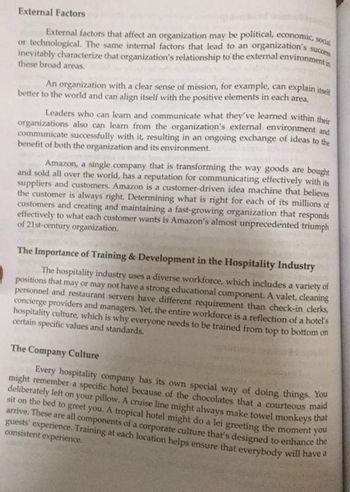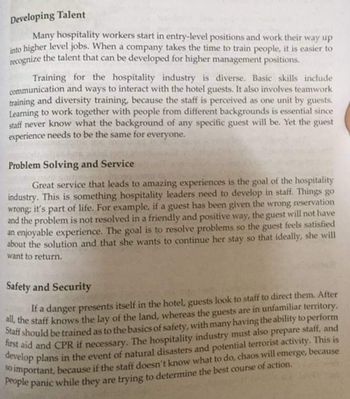
Understanding Business
12th Edition
ISBN: 9781259929434
Author: William Nickels
Publisher: McGraw-Hill Education
expand_more
expand_more
format_list_bulleted
Question
thumb_up100%
Please explain the photo attached and cite some examples thank you

Transcribed Image Text:External Factors
External factors that affect an organization may be political, economic, social
or technological. The same internal factors that lead to an organization's success
inevitably characterize that organization's relationship to the external environment in
these broad areas.
explain itself
An organization with a clear sense of mission, for example, can
better to the world and can align itself with the positive elements in each area.
Leaders who can learn and communicate what they've learned within their
organizations also can learn from the organization's external environment and
communicate successfully with it, resulting in an ongoing exchange of ideas to the
benefit of both the organization and its environment.
Amazon, a single company that is transforming the way goods are bought
and sold all over the world, has a reputation for communicating effectively with its
suppliers and customers. Amazon is a customer-driven idea machine that believes
the customer is always right. Determining what is right for each of its millions of
customers and creating and maintaining a fast-growing organization that responds
effectively to what each customer wants is Amazon's almost unprecedented triumph
of 21st-century organization.
The Importance of Training & Development in the Hospitality Industry
The hospitality industry uses a diverse workforce, which includes a variety of
positions that may or may not have a strong educational component. A valet, cleaning
personnel and restaurant servers have different requirement than check-in clerks,
concierge providers and managers. Yet, the entire workforce is a reflection of a hotel's
hospitality culture, which is why everyone needs to be trained from top to bottom on
certain specific values and standards.
The Company Culture
Every hospitality company has its own special way of doing things. You
might remember a specific hotel because of the chocolates that a courteous maid
deliberately left on your pillow. A cruise line might always make towel monkeys that
sit on the bed to greet you. A tropical hotel might do a lei greeting the moment you
arrive. These are all components of a corporate culture that's designed to enhance the
guests' experience. Training at each location helps ensure that everybody will have a
consistent experience.

Transcribed Image Text:Developing Talent
Many hospitality workers start in entry-level positions and work their way up
into higher level jobs. When a company takes the time to train people, it is easier to
recognize the talent that can be developed for higher management positions.
Training for the hospitality industry is diverse. Basic skills include
communication and ways to interact with the hotel guests. It also involves teamwork
training and diversity training, because the staff is perceived as one unit by guests.
Learning to work together with people from different backgrounds is essential since
staff never know what the background of any specific guest will be. Yet the guest
experience needs to be the same for everyone.
Problem Solving and Service
Great service that leads to amazing experiences is the goal of the hospitality
industry. This is something hospitality leaders need to develop in staff. Things go
wrong; it's part of life. For example, if a guest has been given the wrong reservation
and the problem is not resolved in a friendly and positive way, the guest will not have
an enjoyable experience. The goal is to resolve problems so the guest feels satisfied
about the solution and that she wants to continue her stay so that ideally, she will
want to return.
Safety and Security
prepare
staff, and
If a danger presents itself in the hotel, guests look to staff to direct them. After
all, the staff knows the lay of the land, whereas the guests are in unfamiliar territory.
Staff should be trained as to the basics of safety, with many having the ability to perform
first aid and CPR if necessary. The hospitality industry must also
develop plans in the event of natural disasters and potential terrorist activity. This is
so important, because if the staff doesn't know what to do, chaos will emerge, because
people panic while they are trying to determine the best course of action.
Expert Solution
This question has been solved!
Explore an expertly crafted, step-by-step solution for a thorough understanding of key concepts.
This is a popular solution
Trending nowThis is a popular solution!
Step by stepSolved in 3 steps

Knowledge Booster
Similar questions
- Please can I get the references for these please or the website to find the information?arrow_forwardYour supervisor made a statement that, ‘It is not compulsory to attend the staff meetings as long as you come to work’. As a university student, evaluate the statement to the members of staff who have stopped attending the staff meetings and the consequences.arrow_forwardexplain transactional relationship between a buyer and seller with a practical example to support your explanationarrow_forward
- Decide on what information should be included in the job advertisementarrow_forwardWhat is the difference between shallow and profound copywriting?arrow_forwardThe founder of your company believes that younger employees are more dynamic and perform better in sales positions. He recommends that you set an age requirement for the position for applicants between the ages of 18 and 25 before placing a fresh job ad for your sales division. Is his recommendation reasonable? Why or why not?arrow_forward
- Please define and describe the purpose of using multiple aspects of identification (MFA).What level of security does it provide against password theft?arrow_forwardDiscuss the effectiveness of a sales letter when it grabs the reader’s attention, builds interest, and motivates action. What mistakes have you seen in sales letters that should be avoided in your writing? Provide some concrete examples on how they could be overcome.arrow_forwardintroduction about Redbullarrow_forward
- Is a process that allows clients not to only realize their problems, but that also helping them to overcome themarrow_forwardDistinguish between open-ended and close-endedarrow_forwardWhat do you do when confronted with a restaurant menu that doesn’t include the types of information that, by law, must be included on food labels? How can an understanding of the DRIs, MyPlate, and other guidelines help you make healthy choices even without a nutrition label?arrow_forward
arrow_back_ios
arrow_forward_ios
Recommended textbooks for you
 Understanding BusinessManagementISBN:9781259929434Author:William NickelsPublisher:McGraw-Hill Education
Understanding BusinessManagementISBN:9781259929434Author:William NickelsPublisher:McGraw-Hill Education Management (14th Edition)ManagementISBN:9780134527604Author:Stephen P. Robbins, Mary A. CoulterPublisher:PEARSON
Management (14th Edition)ManagementISBN:9780134527604Author:Stephen P. Robbins, Mary A. CoulterPublisher:PEARSON Spreadsheet Modeling & Decision Analysis: A Pract...ManagementISBN:9781305947412Author:Cliff RagsdalePublisher:Cengage Learning
Spreadsheet Modeling & Decision Analysis: A Pract...ManagementISBN:9781305947412Author:Cliff RagsdalePublisher:Cengage Learning Management Information Systems: Managing The Digi...ManagementISBN:9780135191798Author:Kenneth C. Laudon, Jane P. LaudonPublisher:PEARSON
Management Information Systems: Managing The Digi...ManagementISBN:9780135191798Author:Kenneth C. Laudon, Jane P. LaudonPublisher:PEARSON Business Essentials (12th Edition) (What's New in...ManagementISBN:9780134728391Author:Ronald J. Ebert, Ricky W. GriffinPublisher:PEARSON
Business Essentials (12th Edition) (What's New in...ManagementISBN:9780134728391Author:Ronald J. Ebert, Ricky W. GriffinPublisher:PEARSON Fundamentals of Management (10th Edition)ManagementISBN:9780134237473Author:Stephen P. Robbins, Mary A. Coulter, David A. De CenzoPublisher:PEARSON
Fundamentals of Management (10th Edition)ManagementISBN:9780134237473Author:Stephen P. Robbins, Mary A. Coulter, David A. De CenzoPublisher:PEARSON

Understanding Business
Management
ISBN:9781259929434
Author:William Nickels
Publisher:McGraw-Hill Education

Management (14th Edition)
Management
ISBN:9780134527604
Author:Stephen P. Robbins, Mary A. Coulter
Publisher:PEARSON

Spreadsheet Modeling & Decision Analysis: A Pract...
Management
ISBN:9781305947412
Author:Cliff Ragsdale
Publisher:Cengage Learning

Management Information Systems: Managing The Digi...
Management
ISBN:9780135191798
Author:Kenneth C. Laudon, Jane P. Laudon
Publisher:PEARSON

Business Essentials (12th Edition) (What's New in...
Management
ISBN:9780134728391
Author:Ronald J. Ebert, Ricky W. Griffin
Publisher:PEARSON

Fundamentals of Management (10th Edition)
Management
ISBN:9780134237473
Author:Stephen P. Robbins, Mary A. Coulter, David A. De Cenzo
Publisher:PEARSON